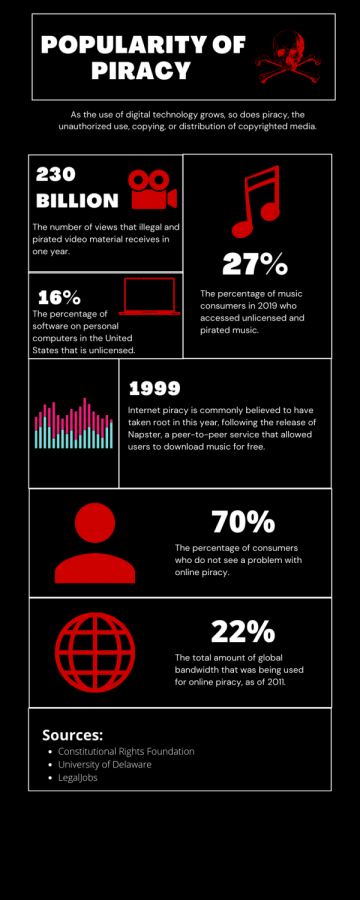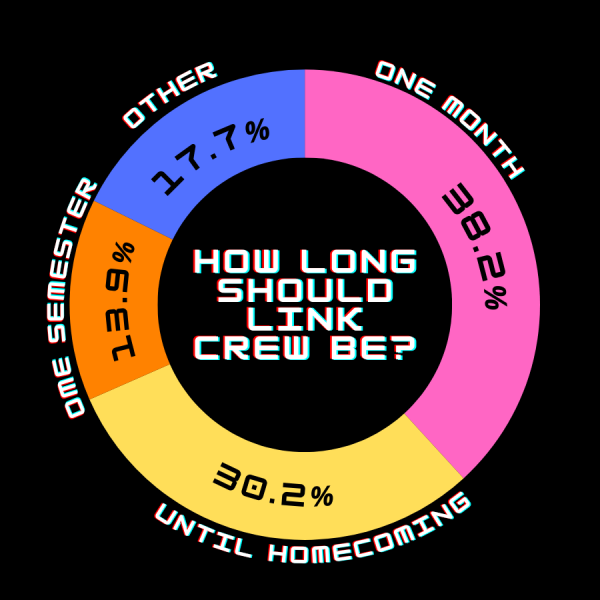Piracy: Friend to the entertainment industry (At least it should be)
Ever since the internet boom in the ‘90s, there has been a plague in the entertainment industry, and it’s rocked its rich members to their cores. That plague is piracy. Piracy is viewing or listening to media in a form that is not authorized by the legal owners. Corporations such as ViacomCBS and Disney have tried to eradicate piracy out of fear of losing money, but their attempts have been largely unsuccessful. But what if the entertainment industry could turn this loss into a positive, by taking advantage of pirating?
The entertainment industry has been incredibly reliant on cable packages, commercials, ticket sales, sales of media discs and direct sales through fellow corporations trusted by the industry. However, as a result of high-speed internet and the popularity of piracy websites, people have been able to find ways to cut out this middleman. Various companies have made attempts to halt this, such as lobbying for various anti-piracy laws, posting annoying disclaimers before and after a movie, and probably the most infamous ad of all, a public service announcement from the Federation Against Copyright Theft and the Motion Picture Association, which stated: “YOU WOULDN’T STEAL A CAR; YOU WOULDN’T STEAL A HANDBAG; YOU WOULDN’T STEAL A TELEVISION; YOU WOULDN’T STEAL A MOVIE; DOWNLOADING PIRATED FILMS IS STEALING; STEALING IS AGAINST THE LAW.”
Every time the FBI shuts down a piracy site and enforces their five years jail time and a $250,000 fine, another website will be created with a similar, if not identical, purpose. These attempts have had a limited effect on the halting of piracy. It’s to the point where shows like “South Park” and “The Simpsons” have satirized people in the entertainment industry for overdramatizing the pirating issue and their obsession with greed. For instance, in one episode of “South Park,” Detective Harris shows Stan, Kyle and Kenny on an airfield while saying, “Britney [Spears] used to have a Gulfstream IV. Now she’s had to sell it and get a Gulfstream III because people like you chose to download her music for free. The Gulfstream III doesn’t even have a remote control for its surround-sound DVD system. Still think downloading music for free is no big deal?”
When interviewed by CNBC in February 2012, former Disney CEO Bob Iger expressed frustration with the failure to pass anti-piracy bills, stating that “the battle should not be Hollywood against the tech sector. We should be together battling those that are stealing our property and reselling it.”
Throughout the years, the entertainment industry hasn’t always been the kindest to its fans. Many people are unable to afford streaming and/or cable boxes, and some are turned off by the greediness of corporations. Others want to watch shows that will never be shown in America, for example, the original Japanese version of “Power Rangers.” These are the main reasons why piracy is popular.
Although pirating is stealing, Iger might have overlooked the opportunity that piracy might be able to provide. Personally, I don’t condone piracy, but it’s never going to go away. So instead of looking to wage pointless wars on these websites, what if the entertainment industry were to take advantage of it?
The media owners could encourage traditional pirating sites to work with them, not against them, as long as they are promoting the owner’s content. If the owner provides free content and then the pirate agrees to promote the owner’s content, this would encourage the pirate to work with the owners instead of working against them. The advertisements sold on the site would likely increase, benefiting the pirate, who could be paid based on traffic and advertisement clicks, while the consumer would have greater access to content and not have to worry about unsafe links. Not only would the entertainment industry benefit financially and avoid endless legal battles, they can use the website traffic data to analyze the ratings and comments from these videos and audio files to gauge interest in their projects, while also getting a small cut of profits off of each video.
Kids that are usually unable to get out to the movies or theater have been introduced to many shows, music and movies through pirated media that they would have never have had access to otherwise. This has driven sales up in the live versions (pre-Covid) of these shows and movies that they enjoyed. These shows have gained a wider audience due to the piracy. According to a study from the University of Georgia, research found that pirating movies raised box office sales via word of mouth: “Movie studios estimate that they lose billions of dollars to digital movie piracy. But a new marketing study from the University of Georgia finds that piracy can actually boost ticket sales in certain situations. The reason: pirates talk. Pirated movies circulated online after their theatrical release saw about 3% higher box office receipts because of the increase in word-of-mouth advertising, according to Neil Bendle, an associate professor of marketing at the Terry College of Business.” The study added that “Bendle is quick to point out that pre-release piracy is still financially damaging for movie studios. But post-theatrical release piracy was connected to more word-of-mouth and higher ticket sales.”
Also, the widespread release of the content could cause an increase in sales of concert, theater tickets and merchandise. For example, people might listen to the soundtrack to “Hamilton” on YouTube for free, then see it on stage or screen and buy the merchandise. The same thing goes for kids shows like “Thomas and Friends” and films like “Star Wars.” Many people can’t afford tickets to the IMAX or the Dolby Cinema, which leads to starting out in the world of piracy, eventually increasing ticket sales. This way, instead of creating hostility between the entertainment industry, the pirates, and the average consumer, the doors could be opened for collaboration.
As stated in the graphic, 70% of people are OK with piracy, and it seems like many have just given up on going into theaters as a result of the pandemic. It’s a lot easier to pirate media than fork over a sum of money for streaming service subscriptions. Eventually, when the world reopens, live entertainment will move towards a renaissance. Collaborating with pirates would not only allow them to regain some lost profit, it would also make common people who couldn’t afford the items, or wouldn’t necessarily want to deal with certain aspects of the industry, a lot happier, and possibly open up a better market for the industry’s goods and services in the future.
To finalize this argument, I would like to share the main takeaway from the same “South Park” episode mentioned before. Near the end of the episode, Stan and Kyle realize that making content shouldn’t be about just making money; it should be about making the content. Their reasoning is “Because that’s what real artists do. People are always gonna find a way to copy our music and swap it for free. If we’re real musicians, then we should just play and be stoked that so many people are listening. Besides, maybe our sound would have gotten downloaded for free, but if they were good songs, then people still would have bought tickets to see our band in concert.” This also applies to films and TV shows. If the entertainment industry wants to avoid an early grave, they should probably take a note from the writers of “South Park” and other content creators who have tackled this topic.













